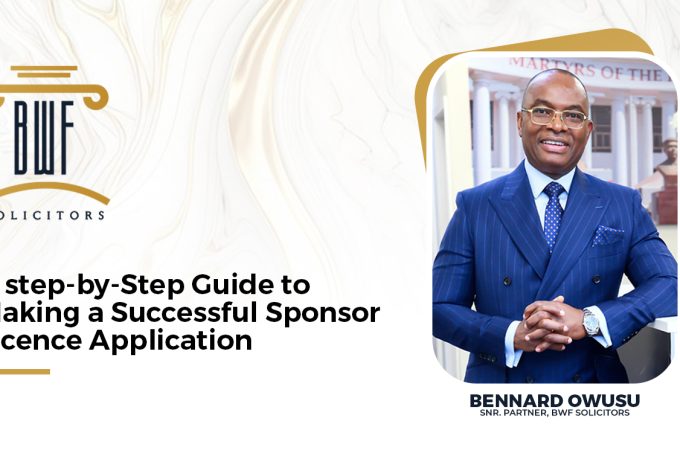How to plan your estate so strangers do not inherit your estate.
The case for drawing up two wills – Ghana & UK
For many approaching later life, concern over the impact inheritance tax and consideration of later life finance, such as arranging a watertight Will, may have on their relatives, understanding and outlining their wishes, making funeral plans, and obtaining a clear and comprehensive view of their assets is a very real and important issue.
Estate planning provides a viable and sound way to prepare your finances and affairs to ensure that your assets are protected for your loved ones once you are gone.
What is inheritance tax?
In England, inheritance tax is a tax paid upon death calculated against the value of your remaining assets over the amount of £325,000, including property, belongings, and savings.
The current rate of inheritance tax is 40%.
Ghana
No inheritance tax is levied in Ghana.
Plan for the future.
More and more people are looking to protect their assets against the impact of inheritance tax, enabling them to ensure that they can leave more to loved ones when they die.
The Ghana Law on Gifting
Gifts falling under the following categories are exempt from taxation:
- Made under a will or interstate
- Made between spouses, children, and specified close relatives (brother, sister, aunt, uncle, nephew, or niece).
- Made to religious bodies for the benefit of the public or sections of the public.
- Made for charitable or educational purposes.
Making a will
A will is the only way to make sure your money, property, possessions, and investments (known as your estate) go to the people and causes you care about, and provisions are made for guardianship of your underage children and funeral arrangements.
What is a will?
A will or testament is a legal document that expresses a person’s (testator) wishes as to how their property/assets (estate), appointing guardians for children, making arrangements for funeral is to be distributed after their death and as to which person (executor) is to manage the property until its final distribution.
In Ghana, the relevant laws are The Wills Act, 1971 (Act 360), the Administration of Estates Act, 1961 (Act 63), and the Probate and Administration Rules, 1991 (LI 1515).
Requirements for a valid will
For a will to be valid, it must be:
- made by a person who is 18 years old or over and
- made voluntarily and without pressure from any other person, and
- made by a person who is of sound mind. This means the person must be fully aware of the nature of the document being written or signed and aware of the property and the identities of the people who may inherit and
- in writing and
- signed by the person making the will in the presence of two witnesses and
- signed by the two witnesses, in the presence of the person making the will, after it has been signed.
A witness or the married partner of a witness cannot benefit from a will. If a witness is a beneficiary (or the married partner or civil partner of a beneficiary), the will is still valid, but the beneficiary will not be able to inherit under the will.
Although it will be legally valid even if it is not dated, it is advisable to ensure that it also includes the date on which it was signed.
As soon as the will is signed and witnessed, it is complete.
If someone makes a will but it is not legally valid, on their death, their estate will be shared out under certain rules, not according to the wishes expressed in the will.
Who are the executors?
Executors are the people who will be responsible for carrying out your wishes and sorting out the estate.
They will have to collect all the assets of the estate, deal with all the paperwork, and pay all the debts, taxes, funeral, and administration costs out of the money in the estate.
They will need to pay out the gifts and transfer any property to beneficiaries.
Who to choose as executors
It is not necessary to appoint more than one executor, although it is advisable to do so in case one of them dies.
It is common to appoint two executors, but up to four can take on responsibility for administering the will after a death.
The people most commonly appointed as executors are:
- relatives or friends
- Solicitors or accountants
- banks
You should always approach anyone you are thinking of appointing as an executor to see if they will agree to take on the responsibility. If someone is appointed who is not willing to be an executor, they have a right to refuse.
If an executor dies, any other surviving executor(s) can deal with the estate. If there are no surviving executors, legal advice should be sought.
Change of circumstances
When a will has been made, it is important to keep it up-to-date to take account of changes in circumstances.
It is advisable for you to reconsider the contents of a will regularly to make sure that it still reflects your wishes. The most common changes in circumstances that affect a will are:
- getting married or remarried
- getting divorced
- the birth or adoption of children, if you wish to add these as beneficiaries in a will.
How to change a will
You may want to change your will because of a change in circumstances.
You must not do this by amending the original will after it has been signed and witnessed.
Any obvious alterations on the face of the will are assumed to have been made later and do not form part of the original legally valid will.
The only way you can change a will is by making:
- a codicil to the will or
- a new will
Codicils
A codicil is a supplement to a will that makes some alterations but leaves the rest of it intact. This might be done, for example, to increase a cash legacy, change an executor or guardian named in a will, or add beneficiaries.
A codicil must be signed by the person who made the will and witnessed in the same way. However, the witnesses do not have to be the same as in the original will.
There is no limit on how many codicils can be added to a will, but they are only suitable for very straightforward changes. If a complicated change is involved, it is usually advisable to make a new will.
Making a new Will to replace the old Will
If you wish to make major changes to a will, it is advisable to make a new one.
The new will should begin with a clause stating that it revokes all previous wills and codicils. The old will should be destroyed. Revoking a will means that the will is no longer legally valid.
Do I have to change my will if I get remarried or divorced?
If you marry or remarry, this cancels a previously existing will. Divorce doesn’t automatically invalidate a will made during the marriage, but it does exclude your ex-spouse from benefiting if they are mentioned in the will. Arrange a new will if you marry, separate, or divorce.
Revocation
Wills are not cast in stone. In just the same way that it is made, it can be withdrawn or revoked. A will can always be revoked before the death of the testator. However, the revocation must be in accordance with the law. A will may be revoked by:
- other physical destruction by the Testator or by some other person in his presence and by his direction, provided it was made with the intention of revoking it;
- a written declaration to revoke it executed in the same manner as a will;
- the execution of another will, which is expressed to revoke the previous will. In the absence of the expression to revoke the previous will in the subsequent one, the previous will remains valid.
It must be pointed out that the accidental destruction of a will is not enough to revoke it.
Probate
If you are named in someone else’s will as an executor, you may have to apply for probate so that you can deal with their estate.
Ghana
A very important aspect of the work that most executors do not know is that immovable property such as land and houses must be vested in the beneficiaries. A document transferring the devised property to the beneficiary cloaks the beneficiary with the power of ownership, and he must register the same with the Lands Commission. He can then deal with it as he pleases.
Conney v. Bentum – Williams [1984–86] 2 GLR 301-318 establishes three important principles affecting wills.
- Unless a will has been admitted to probate, it has no legal effect.
- A beneficiary of an estate must have the property vested in his name to have legal power.
- After the vesting assent, the property must be registered with the Lands Commission to have legal validity. Thus, if you sell the property willed to you without observing the procedures above, your deed is null and void!
In circumstances where the executor is dead and there is none else, the customary successor of the executor shall be the one who will then apply for Letters of Administration with a will annexed, and probate would be granted by the court.
Wills made outside Ghana
In Re:Yena, Deceased [1960] GLR 195-201). Where a will is made outside Ghana but is valid according to the internal laws of the country where the testator lived, it shall be given effect in Ghana. (In Re:Lartey (deceased); Lartey v. Affutu-Nartey [1972] 2 GLR 488–501)
What happens if I do not make a will?
If you do not make a will, you will die ‘intestate’ and your estate may not go to the people you want. There are special rules for how your estate will be distributed; these are called intestacy rules.
Rules of intestacy
If you die intestate, i.e., without a valid will, then your estate will be distributed according to the rules of intestacy set out in law, starting with your spouse, then your children, grandchildren, parents, siblings, and other specified family members (English Law).
Under Ghanaian law, the rules of intestacy are different.
Sometimes the effect of this may be just the same as what you would have chosen if you had left a will, but often there will be important differences.
When a partial intestacy arises
It is usual to expect that if your executors follow the terms of your will completely, then the whole of your estate will be distributed amongst the beneficiaries. Unfortunately, however, this is not always the case. Occasionally, a will:
- does not dispose of all the specific assets.
- may dispose of only part of an asset (perhaps a house) and make no provision about the rest of the assets.
- may not contain any provision as to the residuary estate.
This can cause difficulties.
It is a common misconception that if the will does not deal with all the estate, then it is completely null and void. But this is not the case. The will is still binding as far as all the assets it covers.
If there is a valid will but it does not cover the whole estate, then there is said to be partial intestacy. In contrast, a full intestacy arises when there is no will at all, or there was a will, but it is invalid.
Effect of partial intestacy
The distribution of an estate where there is full intestacy is carried out according to the rules of intestacy, which, among other things, decides who will receive the estate from a strict order of priority set down in law.
In a partial intestacy, the provisions of the will are implemented first, and then the intestacy rules apply to the parts of the estate not covered by the will. In principle, the parts of the estate not covered by the will are divided according to the same order of priorities. But there are some complicated modifications to the rules, so specialist, professional advice would be needed.
Intestate succession laws in Ghana
Intestate succession laws in Ghana also apply to foreigners.
The Intestate Succession Act, 1985 (PNDCL 111) applies automatically, subject to the rules of Private International Law, to both foreigners and citizens of Ghana who die leaving assets in Ghana but do not make a will.
However, experience shows that many Ghanaian families do not follow the provisions of PNDC Law 111, fearing it would dissipate their property. Most families still rely on the dictates of customary law.
Intestate Distribution in Ghana
Under the rules of PNDCL 111, in the absence of a will, the entire estate of the deceased devolves to the next of kin.
The compulsory beneficiaries are the children, spouse, and parents of the deceased. The fraction of the estate distributed to each person varies according to the numbers and categories involved in the distribution.
Effect of marriage on your will
In England, when you marry, any existing will is automatically revoked (cancelled) and becomes no longer valid.
If you do not draw up a new one, then when you die, the law of intestacy decides how your assets are divided.
In Ghana, under the Wills Act of 1971, no such provision exists. So, in Ghana, a will is not automatically revoked by marriage.
Effect of Divorce on your Will
Where a gift is made to a spouse but the parties marriage is dissolved before the testator dies, any gift to your former spouse takes effect as if he or she had died on the date of the dissolution of the marriage.
In Ghana, this rule also applies and has been saved by Section 38 of the Matrimonial Causes Act, 1971 unless the contrary is stated. “Any gift to or appointment in favour of one spouse in the will of the other shall be invalidated if the marriage has been terminated under this Act by divorce or annulment, unless the will contains an express provision to the contrary”.
Mathematics of distribution
The surviving spouse and/or children are entitled to all the household chattels of the deceased.
If the estate includes one house, the surviving spouse and/or children are entitled to own it.
If the estate includes more than one house, the surviving spouse and/or children must decide how the houses are devolved, and they own the houses as tenants in common.
If the deceased has no family, the Administrator-General takes charge of the payment of the deceased´s debts, fees, expenses, and liabilities and pays the balance to the Accountant-General.
Do not be a muppet; get your affairs in order.
The interplay between Article 22(1) of the Constitution and Section 13(1) of the Wills Act, 1971, Act 360
A surviving spouse can make an application to the High Court for reasonable provision from the estate of the deceased in accordance with Section 13(1) of the Wills Act (Act 360) of 1971 and Article 22(1) of the 1992 Constitution by reason of being a surviving spouse.
Article 22 (1) says, “A spouse shall not be deprived of a reasonable provision out of the estate of a spouse, whether or not the spouse died having made a will”.
Section 13 (1): “If, upon application being made, not later than three years from the date upon which probate of the will is granted, the High Court is of the opinion that a testator has not made reasonable provision, whether during his lifetime or by his will, for the maintenance of any father, mother, spouse, or child under 18 years of age of the testator, and that hardship will thereby be caused, the High Court may, taking account of all relevant circumstances, notwithstanding the provisions of the will, make reasonable provision for the needs of such father, mother, spouse, or child out of the estate of the deceased”.
(2) Without prejudice to the generality of subsection (1), such reasonable provision may include:
(a) payment of a lump sum, whether immediate or deferred, or grant of an annuity or a series of payments
(b) grant of an estate or interest in immovable property for life or any lesser period”.
Bird v. LUCKIE [1850] 8 HARE, 306 b y Knight Bruce that:
“No man is bound to make a will in such a manner as to deserve approbation from the prudent, the wise, or the good. A testator is permitted to be capricious and improvident and is more at liberty to conceal the circumstances and the motives by which he has been actuated in his dispositions. Many testamentary dispositions may seem to the world arbitrary, capricious, and eccentric, for which the testator, if he could be heard, might be able to answer most satisfactorily”.
Azu Crabbe, in his work, ‘The Law of Wills in Ghana, at page 106 that it was “to relieve the family of the testator from unwarranted hardship that Section 13 was enacted” and that the section confers limited power on the court. The learned judge and author states five factors that must be met by a party that comes to court under Section 13(1) of the Wills Act.
In the case of AKUA MARFOA v. MARGARET AKOSUA AGYEIWAA, the Supreme Court, per Baffoe-Bonnie JCAs, reiterated the same principle that for Article 22 of the Constitution to be invoked, the applicant must satisfy the court that:
- that the Appellant is dependent on the testator
- that the application has been brought within three years after the granting of probate of the will.
- that the testator failed, either during his lifetime or by his will, to make reasonable provision for the Appellant.
- that the Appellant is suffering or likely to suffer hardship, and
- that, having regard to all the relevant circumstances, the Appellant is entitled to support out of the estate of the testator.
Can I State Where I Should be Buried in my Will
According to our custom and tradition, which have been upheld by the law courts, once someone dies, the body belongs to the family.
It is only the family, referring to the extended family into which you are born, that decides who the chief mourner is and all the other titles that come with a death.
This customary position was stated in the case of Neequaye & Another v. Okoe, where Lutterodt J. (as she then was) explained that:
“On the authorities, under customary law, death finally determined the authority which a member of a family had over his person, and control and authority over the corpse vested absolutely in the wider family, who were responsible for giving the deceased a funeral not only befitting the status he attained in life but one compatible to the social standing of the family in the community, and members of the family were obliged to contribute to it.”
“My mother died at the age of 90, and we buried her after three weeks; this was and is still regarded in our village as sacrilege.” – Elizabeth Ohene
Have you considered all your life and medical insurance?









